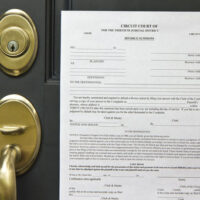Serving Divorce Papers in Florida

The Florida divorce process starts when a spouse files a petition with the court, requesting a dissolution of his or her marriage. As a part of this process, the petitioner will also need to serve a copy of that petition and an official Summons on his or her spouse. Delivery of these papers is known as service of process. Ensuring that this process is completed properly is very important, as obtaining divorce is only possible when the petition and summons have been served on the other spouse. Furthermore, service of process sets the deadline for how long the other party has to respond to the divorce petition.
Methods of Service of Process
There are a few different ways to serve divorce papers on a spouse, although doing so personally is not one of them. Instead, a person filing for divorce will usually hire a process server, or neutral third party, to handle the task on his or her behalf. Forms of service include:
- Acceptance of service, which occurs when the recipient signs an affidavit admitting that he or she accepts the service of the divorce papers;
- Service by mail, which requires that the recipient sign a return receipt with the post office, proving that he or she received the summons;
- Personal service, which occurs when the divorce papers in question are handed directly to the recipient by the sheriff in the county where the recipient lives, or by a designated process server;
- Service by substitution, which involves leaving the divorce papers with someone residing at the recipient’s address (who is at least 15 years old and understands that they are receiving legal documents); and
- Service by publication, which process servers can attempt when they have made a number of unsuccessful attempts to serve the other spouse and involves publishing a notice in the newspaper.
If a petitioner’s spouse lives in another state, then he or she will need to be sure to abide by the service of process rules of that state. Usually, this involves hiring a process server who is authorized to serve legal documents in that jurisdiction.
What Happens Next
Once a petitioner has ensured that divorce papers have been successfully filed with his or her spouse, then the recipient has 20 days to file a response. Those who fail to do so or who don’t ask for an extension will lose their chance to respond to the petitioner’s allegations or request for relief and the court can enter a default judgment in the petitioner’s favor. If, on the other hand, the recipient spouse does respond to the petitioner, then the direction of the divorce case will depend on whether the parties can reach an agreement on the proposed divorce settlement or whether they dispute the terms of divorce. In the latter case, the parties may need to litigate their case in court.
Here to Help with Your Divorce-Related Questions
If you have questions about how to go about initiating your divorce, or what your obligations are in regards to serving divorce papers on your spouse, don’t hesitate to call the experienced Largo divorce lawyers at Cairns Law for assistance. You can set up an initial consultation by calling our office at 727-683-1472 or by reaching out to our legal team via online message.
Sources:
flcourts.gov/Resources-Services/Office-of-Family-Courts/Family-Court-in-Florida/Family-Law-Forms/Petition-for-Dissolution-of-Marriage-12.901-Forms-A-B3
law.cornell.edu/wex/service_of_process
